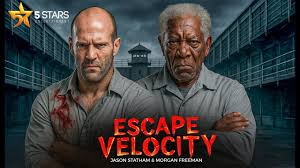Watch movie:
Freeman delivers a masterclass in subtlety. His portrayal of Monroe is layered with decades of buried pain, wisdom earned in solitude, and an unbreakable core. Every line he speaks, every silent look carries weight — not just of a man planning to escape a prison, but of someone determined to escape the fate society has laid upon him.
Alongside him are memorable supporting performances: Kelvin Harrison Jr. plays a talented young inmate, an artist searching for meaning; Ciarán Hinds plays an ailing Irish prisoner who becomes both confidant and conscience. These characters give depth to the prison ecosystem — a place where desperation meets dignity.

The escape itself unfolds not with explosive action, but with crushing tension. Using primitive tools, paper-mâché heads, and shadowy corridors, the film turns each minute into a suspenseful heartbeat. Fuqua’s direction turns the prison into a living entity — every creak, every echo becomes a threat.
Visually, the film is stunning. Stark lighting, muted colors, and sweeping contrasts between Alcatraz’s stone coldness and the vastness of the surrounding bay elevate the atmosphere. The score by Nicholas Britell is haunting and minimalist, enhancing moments of silent fear and faint hope.
The final act is unforgettable. As the storm crashes against the island and the inmates make their desperate escape, time feels frozen. The ending stays true to the spirit of the original — ambiguous, poetic, and symbolic. Did they make it? Maybe. But what matters is the will to try, the refusal to be caged any longer.

Conclusion: Escape from Alcatraz (2025) is not about breaking bars — it’s about breaking silence, injustice, and resignation. Morgan Freeman delivers one of the most powerful performances of his career, and the film as a whole becomes a meditation on freedom, purpose, and the quiet courage to fight back.

🔓 Final Score: 9.4/10 – Thoughtful, intense, and profoundly human. A prison break film that doesn’t shout… it whispers — and still echoes long after it ends.



